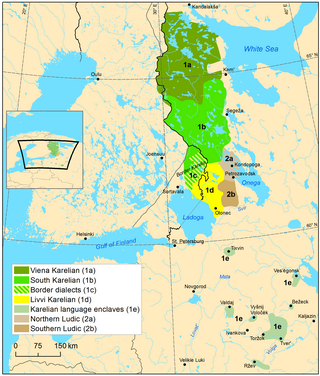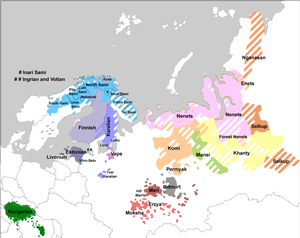Ludic language
| Ludic | |
|---|---|
| lyydin kiel', l'yyd'ikiel' | |
| Native to | Russia (Republic of Karelia) |
| Region | Near northwestern shore of Lake Onega |
Native speakers | 300 (2017)[4] |
| Latin (Karelian alphabet) | |
| Official status | |
Recognised minority language in | |
| Language codes | |
| ISO 639-3 | lud |
| Glottolog | ludi1246 |
| ELP | Ludian |
 | |
 [image reference needed] Lude is classified as Severely Endangered by the UNESCO Atlas of the World's Languages in Danger (2010) | |

Ludic, Ludian, or Ludic Karelian (Luudi, Lyydi or lüüdi), is a Finnic language in the Uralic language family or a Karelian dialect. It is transitional between the Olonets Karelian language and the Veps language.[4] It is spoken by 300 Karelians in the Republic of Karelia in Russia, near the southwestern shore of Lake Onega, including a few children.[5]
Classification
[edit]
In the Finnish research tradition, Ludic has been considered a transitional dialect area between Karelian and Veps,[6] while in the Russian research tradition it is, on ethnographic grounds, normally considered a dialect of Karelian. A status as an independent language has been proposed in recent times.[7] Ludic is characterised by a specific mixture of Karelian-like traits (such as the diphthongisation of the Proto-Finnic non-open long vowels: e.g. *pää > piä 'head', *soo > suo 'swamp', contrast Veps pä, so)[8] and Veps-like traits (such as an almost complete loss of consonant gradation).[9] Like Veps, Ludic has also partially lost vowel harmony.
Dialects
[edit]Ludic comprises three main dialect groups:[7]
- Ludic
- Northern (Lake) Ludic, at the northwestern shores of Lake Onega
- Central (River) Ludic, at settlements along river Shuya and near the city of Petrozavodsk
- Kuďäŕv (Forest) Ludic, in the Mikhaylovskoye rural locality
The strongest Karelian resemblance is found in Northern Ludic, while the Kuďäŕv dialect shares the most features with Veps.
Phonology
[edit]Vowels
[edit]| Front | Back | |||
|---|---|---|---|---|
| unrounded | rounded | unrounded | rounded | |
| Close | i | y | u | |
| Mid | e | ø | o | |
| Open | æ | ɑ | ||
- Vowel length may also be distinctive.
Consonants
[edit]| Labial | Alveolar | Palatal | Velar | Glottal | ||||
|---|---|---|---|---|---|---|---|---|
| plain | pal. | plain | pal. | |||||
| Plosive | voiceless | p | (pʲ) | t | tʲ | k | ||
| voiced | b | (bʲ) | d | dʲ | ɡ | |||
| Affricate | voiceless | t͡s | t͡ʃ | |||||
| voiced | d͡ʒ | |||||||
| Fricative | voiceless | (f) | (fʲ) | s | sʲ | ʃ | (x) | h |
| voiced | v | (vʲ) | z | zʲ | ʒ | |||
| Nasal | m | (mʲ) | n | nʲ | ||||
| Approximant | l | lʲ | j | |||||
| Rhotic | r | rʲ | ||||||
- Sounds /f, fʲ, bʲ, pʲ, vʲ, mʲ/ only occur in recent borrowings.
- /h/ can also be heard as a velar [x].
- /n/ is heard as velar [ŋ] when preceding velar consonants.
- /ɡ/ can be lenited as a fricative [ɣ] in intervocalic positions.
Writing system
[edit]Ludic is written using the unified Karelian alphabet, but in some publications the letter Ü is used instead of Y, as in Veps.
| Majuscule Forms (also called uppercase or capital letters) | ||||||||||||||||||||||||||||
| A | B | C | Č | D | E | F | G | H | I | J | K | L | M | N | O | P | R | S | Š | Z | Ž | T | U | V | Y (Ü) | Ä | Ö | ʼ |
| Minuscule Forms (also called lowercase or small letters) | ||||||||||||||||||||||||||||
| a | b | c | č | d | e | f | g | h | i | j | k | l | m | n | o | p | r | s | š | z | ž | t | u | v | y (ü) | ä | ö | ʼ |
Phrases
[edit]- Ken sina oled? = Who are you?
- Mi tämä on? = What is this?
- Kudam teiš on Onni? = Which one of you is Onni?
- Mikš sina nagrad? = Why are you laughing?
- Kudam čuas on? = What time is it?
- Konz hyö tuldah kodih? = When are they coming home?
- Häin lähtöu huomei. = He/She leaves tomorrow.[10]
See also
[edit]Notes
[edit]- ^ a b Rantanen, Timo; Tolvanen, Harri; Roose, Meeli; Ylikoski, Jussi; Vesakoski, Outi (2022-06-08). "Best practices for spatial language data harmonization, sharing and map creation—A case study of Uralic". PLOS ONE. 17 (6): e0269648. Bibcode:2022PLoSO..1769648R. doi:10.1371/journal.pone.0269648. PMC 9176854. PMID 35675367.
- ^ a b Rantanen, Timo, Vesakoski, Outi, Ylikoski, Jussi, & Tolvanen, Harri. (2021). Geographical database of the Uralic languages (v1.0) [Data set]. Zenodo. https://doi.org/10.5281/zenodo.4784188
- ^ "Законодательные акты: О государственной поддержке карельского, вепсского и финского языков в Республике Карелия". Archived from the original on 2017-10-11. Retrieved 2011-01-08.
- ^ a b Ludic at Ethnologue (18th ed., 2015) (subscription required)
- ^ "Uhanalainen lyydi on oma itämerensuomalainen kielensä | Humanistinen tiedekunta | Helsingin yliopisto". 8 February 2017.
- ^ Itkonen, Terho (1971). "Aunuksen äänneopin erikoisuudet ja aunukselaismurteiden synty". Virittäjä (75): 182.
- ^ a b Pahomov 2011, p. 10.
- ^ Pahomov 2011, p. 29.
- ^ Pahomov 2011, p. 32.
- ^ Pahomov, Miikul (2019). Venä-lüüdin paginnik Русско-людиковский разговорник. Lüüdilaine Siebr.
Literature
[edit]- Barantsev, Aleksandr P. (1975), Fonologicheskiye sredstva lyudikovskoy rechi (Deskriptivnoye opisaniye) (in Russian), Leningrad; Nauka
- Pahomov, Miikul (2011), Kuujärven lyydiläistekstejä, Suomalais-Ugrilaisen Seuran Toimituksia, vol. 263, Helsinki: Suomalais-Ugrilainen Seura, ISBN 978-952-5667-32-5
- Ojanen, Muusa (1985), Adjektiivikategoria venäläis-lyydiläisissä kontakteissa, Suomalais-Ugrilaisen Seuran Toimituksia, vol. 188, Helsinki / Joensuu: Suomalais-Ugrilainen Seura / Joensuun yliopisto, ISBN 951-9019-89-8
- Ojansuu, Heikki; Kujola, Juho; Kalima, Jalo; et al., eds. (1934), Lyydiläisiä kielennäytteitä, Suomalais-Ugrilaisen Seuran Toimituksia (in Finnish), vol. LXIX, Helsinki: Suomalais-Ugrilainen Seura
- Turunen, Aimo (1946), Lyydiläismurteiden äännehistoria. I. Konsonantit, Suomalais-Ugrilaisen Seuran Toimituksia (in Finnish), vol. LXXXIX, Helsinki: Suomalais-Ugrilainen Seura
- Turunen, Aimo (1950), Lyydiläismurteiden äännehistoria. II. Vokaalit, Suomalais-Ugrilaisen Seuran Toimituksia (in Finnish), vol. XCIX, Helsinki: Suomalais-Ugrilainen Seura
- Virtaranta, Pertti (1963), Lyydiläisiä tekstejä. I, Suomalais-Ugrilaisen Seuran Toimituksia (in Finnish), vol. 129, Helsinki: Suomalais-Ugrilainen Seura
- Virtaranta, Pertti (1963), Lyydiläisiä tekstejä. II, Suomalais-Ugrilaisen Seuran Toimituksia (in Finnish), vol. 130, Helsinki: Suomalais-Ugrilainen Seura
- Virtaranta, Pertti (1964), Lyydiläisiä tekstejä. III, Suomalais-Ugrilaisen Seuran Toimituksia (in Finnish), vol. 131, Helsinki: Suomalais-Ugrilainen Seura
- Virtaranta, Pertti (1976), Lyydiläisiä tekstejä. IV, Suomalais-Ugrilaisen Seuran Toimituksia (in Finnish), vol. 132, Helsinki: Suomalais-Ugrilainen Seura
- Virtaranta, Pertti (1984), Lyydiläisiä tekstejä. V, Suomalais-Ugrilaisen Seuran Toimituksia (in Finnish), vol. 165, Helsinki: Suomalais-Ugrilainen Seura, ISBN 951-9019-81-2
- Virtaranta, Pertti (1986), Haljärven lyydiläismurteen muoto-oppia, Suomalais-Ugrilaisen Seuran Toimituksia (in Finnish), vol. 190, Helsinki: Suomalais-Ugrilainen Seura, ISBN 951-9019-96-0
- Virtaranta, Pertti (1994), Lyydiläisiä tekstejä. VI. Anna Vasiljevna Tshesnakovan kerrontaa ja itkuvirsiä, Suomalais-Ugrilaisen Seuran Toimituksia (in Finnish), vol. 218, Helsinki: Suomalais-Ugrilainen Seura, ISBN 951-9403-72-8
External links
[edit]

